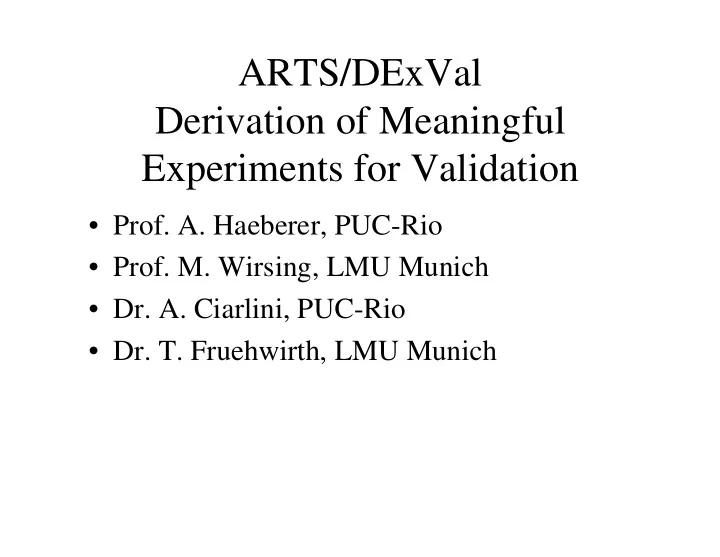

ARTS/DExVal Derivation of Meaningful Experiments for Validation • Prof. A. Haeberer, PUC-Rio • Prof. M. Wirsing, LMU Munich • Dr. A. Ciarlini, PUC-Rio • Dr. T. Fruehwirth, LMU Munich
ARTS • Formal basis for software development, funded partially by Siemens, Brazil ARTS VALIDATION AND TESTING CODE ... INTERFACE GENERATION MODEL DEXVAL CHECKERS
Validation and Testing • Critical • Expensive • Revealing maximum number of bugs • Meaningful experiments
Model Checking • Verification of properties • Modal temporal logic • Prop. holds or there is a counterexample • Approximation – Infinite state machines → Finite state machines – Continuous variables → Discrete variables – State explosion
The Goal • Verification and derivation of properties of concurrent transition systems • Continuous variables and non-linear expressions • Expressiveness: variables at different times
The Approach • Symbolical execution • Constraint Logic Programming • User descriptions → all paths and corresponding derived properties • E.g. Constraints on output → constraints on input
Hybrid Automata • Continuous activities • Discrete transitions • Components – Variables – States: name, invariant and iteration – Transitions: source and target states, guarded actions, events
Hybrid System • Timed hybrid automata – Synchronization: machine clock – Modifications according to last state • Coordination: sharing of variables and events • Simultaneous modifications • Variable modified by only one automaton
Constraint Logic Programming • Logic programming – Declarative rules defining relations – Search for all solutions using backtracking – Non-deterministic • Constraint solving – Efficient algorithms – Solving sets of distinguished relations – Deterministic
Constraint Logic Programming • LP + CS: – Expressiveness and efficiency – LP sends constraints to CS – Constraints solved in parallel – Inconsistency → cut branch – Ex: • X+Y<5 and Y>0 • X=6 → fail
DExVal Tool • Input: – Automata – Initial and final states (not mandatory) – Properties:Values or ranges(input, intermediate and output) • Output: Paths and corresponding constraints relating selected variables • Using output for testing OUT>100 → 10<IN<20 OUT ≤ 100 → (IN ≤ 10) ∨ (IN ≥ 20) Better testing IN=1,10,15,20,30 than IN=12,13,14,15,16
Examples of Properties • Since X>Y, Z=1 • For all states, X has a higher value than its value in the previous state • If, at some time, X>Y, then at most 5 clocks later Z=1 • Obs: Existential and universal quantification
Implementation • Preparation stage – Data structure → variables’ history – Translation of descriptions into constraints • Symbolic execution – search for paths – addition of new constraints corresponding to invariants, iterations and transitions
Implementation • Production of answers – Projection on selected variables – Printing • States at each clock • Remaining constraints resulting from execution and projection
Boiler Example
Boiler Automaton
Initial temperature for taking a shower without turning on the heater INPUT: CONSTRAINTS: heater:1=0, pump:1=1, water_volume:1=10.0, shower:1=1, all(X,shower:X=1), all(X,heater:X=0) INITIAL STATES: pump_on, heater_maintain, boiler_normal_heater_off FINAL STATES: (not specified) CLOCKS: 5 PROJECT: temperature:1 (i.e. initial temperature) OUTPUT: Clock Pump Heater Boiler 1 on maintain normal_heater_off 2 on maintain normal_heater_off 3 on maintain normal_heater_off 4 on maintain normal_heater_off 5 on maintain normal_heater_off temperature:1 > 47.18
Behaviour of the shower for the continuous increase of the water level INPUT: CONSTRAINTS: heater:1=0, pump:1=1, temperature:1=30.0, water_volume:1=6.0, all(X,water_volume:(X+1)>water_volume:X) (increase water) INITIAL STATES: pump_on, heater_maintain, boiler_normal_heater_off FINAL STATES: (not specified) CLOCKS: 5 PROJECT: shower:X, water_volume:X (i.e. at all clocks) OUTPUT: Clock Pump Heater Boiler 1 on maintain normal_heater_off 2 on turning_on normal_heater_on 3 on maintain normal_heater_on 4 on maintain normal_heater_on 5 on maintain normal_heater_on shower:[1..4]=0, shower:5=Var, water_volume:1=6.0, water_volume:2=8.0, water_volume:3=10.0, water_volume:4=12.0, water_volume:5=14.0
Summary • We are concerned with validation and testing • Meaningful experiments • Derivation of properties • Symbolic execution • DExVal tool based on CLP
Future work • Integration with ARTS’ graphical interface • Tailoring the behaviour of the constraint solver: – Non-linear constraints – Non-determinism: disjunction and existential quantification • Meaningful experiments: – Methodology – Real applications
Recommend
More recommend